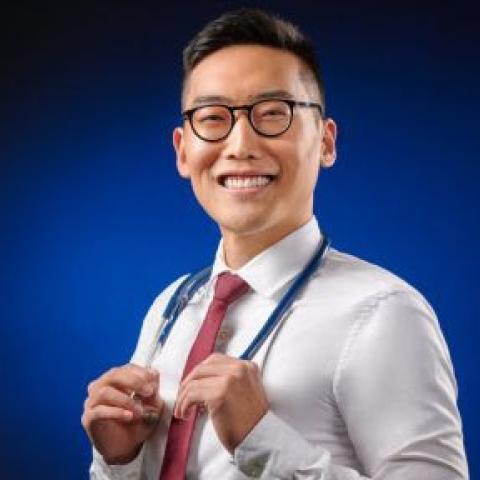In 2014, Uriel Kim dreamt of becoming a physician with a focus on research. Today, he’s well on his way—and is receiving broad recognition for his efforts.
A Doctor of Medicine (MD) student at Case Western Reserve University School of Medicine, Kim earned his PhD in Clinical Translational Science in 2020 through the university’s Medical Scientist Training Program, which solidified his passion for understanding factors related to community health outcomes. This holistic focus has guided his path forward, most recently landing him on Crain’s Cleveland Business’ list of “20 in their 20s.” Joining him were four other CWRU alumni: Lauryn Durham (LAW ’21), Jack Maib (LAW ’18), Rachel Payne (CWR ’18, MGT ’18) and Max Pennington (CWR ’22).
Through his studies, Kim is most interested in the impact of the Affordable Care Act (ACA) on cancer outcomes in individuals from low-income communities, as well as the roles socioeconomic, cultural and systemic factors such as access to safe housing and healthy food options play in determining health.
“I have diverse research interests, but the central thread that connects my research is identifying and understanding health disparities,” said Kim, who is expected to graduate with his MD this spring. “There have been long-standing disparities in cancer stage at diagnosis by socioeconomic status, and following the implementation of the ACA, many of these gaps narrowed substantially.”
Kim’s research also includes the recognition of “weighting by income probabilities,” a new statistical method that allows medical professionals to accurately estimate the income of patients based on the census tracts in which they live.
“Income is a key determinant of access to healthcare services, but this information is often missing from our research datasets.” Kim said. “Thus, this method has come in handy for the many research questions we have related to the impact of income on health outcomes.”
For a deeper understanding of his research, The Daily sat down with Kim for a Q&A..
Answers have been edited for clarity and length.
1. What do you enjoy most about your research? What do you hope to accomplish?
I really enjoy the process of discovery that is intrinsic to research. It’s incredibly rewarding to work with a team to puzzle through data, ultimately arriving at a conclusion that fills a knowledge gap in the literature. The goal for all our research is the same: to provide actionable findings that will improve the care of patients.
2. What does it mean to you to be featured in Crain’s Cleveland Business’ “20 in their 20s” series?
It’s an honor to be featured. The other nominees are incredibly talented and accomplished, so it’s humbling to be included beside them. It’s also gratifying to reflect on all the support I’ve received from my mentors, who have been relentless cheerleaders for my success. It’s a fabulous feeling that I can share this honor with them.
3. What challenges do you face within your field of research?
I think that the key challenge we face is making sure that our research findings find their way to key decision-makers who can influence policies or systems that will improve health outcomes for patients. While delivering excellent clinical care is obviously important, understanding and addressing barriers to receiving care are equally crucial. Therefore, I think it is important for us to be advocates, in addition to being researchers.
4. Are there any common misconceptions of your field of research?
Our research often has a “macro’” perspective since we are looking at structural factors and policies that have an impact on health outcomes. I think a common misconception is that this kind of research can be slightly removed from the lived experience of patients “on the ground.” This is why I believe multidisciplinary collaborations involving researchers, clinicians and patients are important to ensure that we are studying questions that are most meaningful to patients.
5. How has CWRU contributed to your research?
I chose [Case Western Reserve University] because of its Medical Scientist Training Program, the oldest combined MD/PhD program in the world. More than anything, CWRU has contributed to my research by connecting me with amazing mentors who have been incredibly generous with their time and energy as I have developed as a researcher.
6. Where do you hope to take your career and research from here?
The next phase of my career is to focus on building my skills as a clinician. After graduating with my MD, I plan on going to residency. I am excited about this next phase of my career because I believe practicing as a physician will inform my research, and vice versa.


